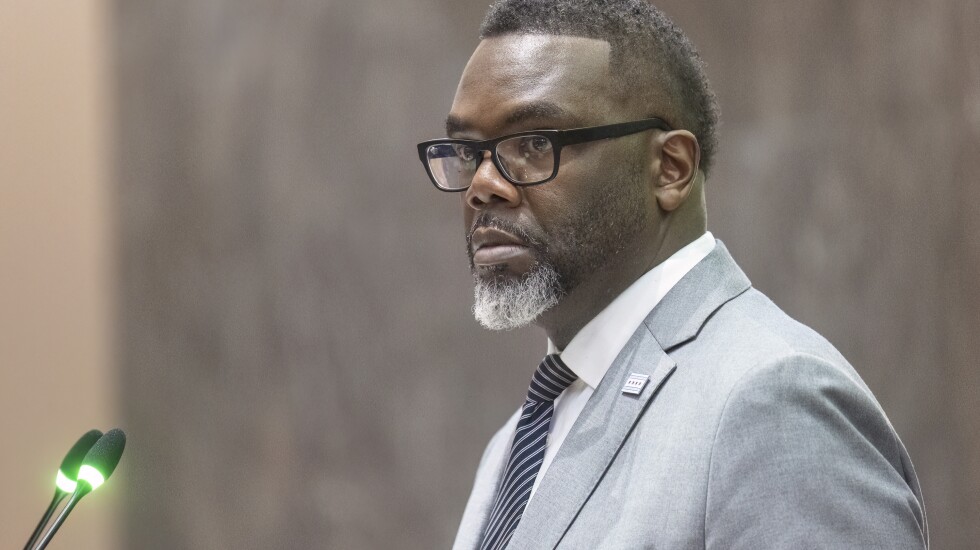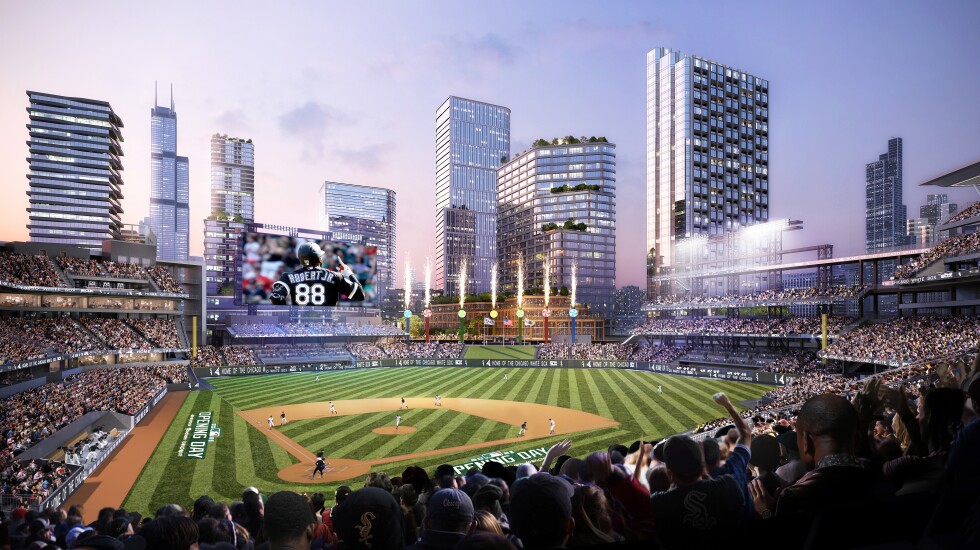Protests in the streets, turmoil at City Hall, corruption trials galore, historically bad baseball and a massive influx of buzzing arthropods unlike any seen since the 1800s.
No wonder so many Chicagoans sought peace at the sidewalk altar of a once-airborne rodent that imprinted itself into a slab of concrete — and into the city’s heart.
In a year that had the national spotlight squared on Chicago, the Sun-Times saw it all. Here’s how we’ll remember 2024.
Chicago shines for DNC
Even Chicago’s famously mercurial weather cooperated through all four days of the Democratic National Convention, which went off without a hitch despite weeks of intraparty uncertainty heading into the spectacle.
Mayor Brandon Johnson earned high marks for shepherding a smooth week for thousands of delegates and media from around the world, while Chicago Police Supt. Larry Snelling enjoyed rave reviews for keeping a reasonable lid on massive protests that mostly focused on the war in Gaza.

The made-for-TV pep rally took on heightened excitement following President Joe Biden’s late withdrawal from the race, while some local flair was injected into the national conversation. The party's new nominee, Vice President Kamala Harris, vetted Gov. JB Pritzker as her potential running mate.
Pritzker fell short of the ticket and Harris fell short of the White House, leaving Democrats scratching their heads — just like some local business owners, who felt left out of the convention’s much ballyhooed economic boost.
Brandon Johnson’s sophomore slump
The DNC provided a rare highlight for the first-term mayor, who could warrant his own top-10 list for bad news cycles in 2024.
Fault lines started showing early in the year when voters rejected Johnson’s Bring Chicago Home referendum, nixing higher taxes on expensive real estate transactions — money that would have been used to help shelter the city’s unhoused population — and delivering the first major roadblock to his progressive agenda.

Johnson saw his City Council support erode as he moved to shut down the city’s controversial ShotSpotter gunshot detection system, and again when he had to defend elevating a top aide with “a history of calling the police “f---ing pigs.”
A revolving door on the fifth floor of City Hall included Johnson’s firing of a longtime confidant and spokesman accused of sexual harassment and antisemitism. And don’t forget Johnson’s pick for school board president who lasted all of one week before a troubling history of social media posts — inexplicably missed by Johnson’s office during the hiring process — led to a swift ouster.
The political chaos came to a crescendo late in the year as an emboldened Council, by a stunning 50-0 vote, shot down the $300 million property tax hike Johnson had included in his proposed 2025 budget — breaking a campaign promise not to raise them. After a series of budget concessions, Johnson scrapped any property tax hike to win Council approval for a budget that relies heavily on one-time revenues and nickel-and-dime fee increases.
Meanwhile, Johnson worked for months to force Chicago Public Schools CEO Pedro Martinez out of his post, installing an entire school board that voted Dec. 21 to fire him — before the city’s first-ever elected board members had a chance to weigh in. The move raised fresh questions about the overwhelming influence of the Chicago Teachers Union.

Preparing for Trump’s return
Donald Trump’s resounding victory to retake the White House put officials on notice in Democratic-dominated Illinois, where the Republican president-elect saw a marginal uptick in voter support.
Advocates for Illinois’ thousands of undocumented residents braced for the wave of legal questions raised by Trump’s promise of mass deportations, as the incoming administration’s border czar declared Chicago ground zero immigration enforcement raids.
The city’s LGBTQ community grappled with similar concerns about the effect of a second Trump term on marriage and parental rights, while health care providers prepared for Illinois to take on an even greater role as the Midwest’s main island of abortion rights.
Officials also raced to lock up key federal transit funding for an extension of the CTA Red Line, the type of assistance from Washington that Democrats say Trump may be keen on withholding from the city that has served as his preferred political punching bag.

Landmark corruption cases
One multi-generational poster boy of Chicago politics saw his federal corruption case come to a head while the fate of another hung in the balance to close out 2024.
Ed Burke reported to a downstate prison to begin serving his two-year sentence for racketeering, bribery and attempted extortion convictions, tied to the longtime 14th Ward alderman’s strong-arming of developers to hire his private law firm.

Mike Madigan spent weeks in a courtroom listening to federal prosecutors map out his sprawling web of influence as speaker of the Illinois House for jurors who will soon be tasked with deciding if Madigan wielded it to squeeze companies for payments to his political cronies.
Natural wonders
Cicadas and tornadoes and geomagnetic storms, oh my!
Mother Nature kept things interesting for Chicagoans with the first dual-emergence of periodical broods of cicadas in more than 200 years, inundating some parts of the area with the very noisy, mostly harmless and debatably tasty insects.
They crawled out of the ground shortly after the latest solar eclipse bedazzled the Midwest, drawing thousands of people to the path of totality that just narrowly missed the city.

Some of the freshly unearthed cicadas were still around for the first in a series of rare aurora borealis displays powered by intense solar storms, igniting the northern lights over Lake Michigan even downtown.
But the natural marvels weren’t all friendly. Thirty-one Chicago-area tornadoes in July set a new record as more frequent bouts of heavy rain and flooding provided a sobering reminder of the looming impacts of climate change.
Up-and-down year for CPD
It was a mixed bag for Snelling in his first full year at the helm of the Chicago Police Department.
Overseeing a seamless DNC earned the freshman superintendent a growing drumbeat of support from Council members across the political spectrum, especially with his department on pace for fewer than 600 homicides, the lowest yearly toll since before the COVID-19 pandemic.

But the killing of 26-year-old Dexter Reed in a hail of 96 bullets during a traffic stop raised new questions about the use of force in the ranks, and a federal monitor last month reminded officials that the department is far behind in its long-running reform effort, reaching full compliance with just 9% of the steps laid out in a consent decree.
Domestic violence questions
Horrific murder cases put officials’ handling of domestic violence under the microscope, highlighting issues that advocates say have persisted for decades.
After 11-year-old Jayden Perkins was killed while defending his mother from an ex-boyfriend who’d been released on parole a day earlier, Gov. Pritzker pushed out two Illinois Prisoner Review Board members and tried to bolster that panel’s domestic violence training.
Dozens of elected officials have joined a chorus calling for the reassignment of the Cook County judge who could’ve detained a man before he allegedly killed his wife, Lacramioara Beldie, in Portage Park.
Advocates say there has been a spike in such attacks in the past year, increasing the lawmakers’ urgency to pass long-stalled legislation that would require law enforcement to promptly remove firearms while serving orders of protection.
Ebb in new arrivals of asylum seekers
The influx of thousands of migrants from the southern border that once overwhelmed the city’s social safety net slowed to a trickle under tighter Biden administration deportation policies, ending months of acrimony over city spending that highlighted racial divides in Chicago.

Concerns over Texas Gov. Greg Abbott sending busloads of migrants to Chicago to embarrass the city during the DNC never materialized. By year’s end the city had closed its migrant landing zone completely as it merged shelter systems for newly arrived asylum seekers and homeless people who have long lived on Chicago’s streets and in its alleys, parks and viaducts.
Chicago teams struggle inside and outside the stadium
White Sox owner Jerry Reinsdorf threw his hat in the public financing ring with a splashy pitch for a new South Loop ballpark, but got shut out by state lawmakers who have rejected giving a dime to either them or the Bears — who rolled out their own renderings of a shiny new lakeside dome.

That sent the McCaskeys back to the drawing board to consider the old Michael Reese Hospital site, or Arlington Heights, where the team finally reached a property tax deal with local school districts that could grease their suburban wheels.
Neither team helped make their case on the field, either, with a pitiful Sox lineup recording the worst season in modern Major League Baseball history and the Bears firing a coach midseason for the first time while squandering what was supposed to be a competitive rookie season for quarterback Caleb Williams, who was drafted first overall in April.
Rat hole
Rat hole (noun) — rodent-shaped imprint on a Roscoe Village sidewalk that drew hordes of curious onlookers for several months in 2024 to the glee of Chicago social media users and chagrin of neighborhood residents.
The latest entry into the Chicago lexicon was inscribed in January when photos of the four-legged sidewalk stamp — which some argue was actually left by a squirrel — went viral online, drawing tourists to the 1900 block of West Roscoe with offerings of coins, and prompting at least one couple to tie the knot.

The city removed (but preserved) the pseudo-sacred sidewalk in April at the request of nearby residents none too pleased with round-the-clock foot traffic.
What’s next for the rat hole? We’ll see in 2025.
Other major 2024 stories
- CTA President Dorval Carter’s seat got hotter as head of a transit agency beset by long wait times, understaffing and looming budget crises.
- The city mourned Chicago police officers Luis Huesca and Enrique Martinez, killed on duty in separate shootings.
- Tipped workers saw their minimum base wages increase en route to eventual parity with the standard minimum wage, in a win for Mayor Johnson and his progressive allies and a loss for restaurant owners.
- Plans moved forward to transform the long-vacant U.S. Steel South Works into a sprawling quantum computing campus as Illinois positions itself as the Silicon Valley of the nascent technology.
- Hackers stole the personal data of more than 800,000 people in a cyberattack on the Lurie Children’s Hospital network, causing months of headaches for patients and their families.
- Chicago rap star Lil Durk was charged in a California murder-for-hire plot.
- The Illinois Supreme Court overturned actor Jussie Smollett’s conviction for staging a hate crime, sparing him five months’ jail time.
- And Dolton Mayor Tiffany Henyard’s south suburban media circus played on, with federal investigators circling her push for no-bid contracts to a construction company linked to multiple corruption investigations, among other questionable spending.








